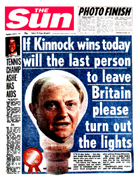 One of the best blogs around at the moment is Dizzy Thinks, which today features this little tale about the announcement of some Government funding for the nine English regions "to tackle local congestion and inform the debate on a national road pricing scheme."
One of the best blogs around at the moment is Dizzy Thinks, which today features this little tale about the announcement of some Government funding for the nine English regions "to tackle local congestion and inform the debate on a national road pricing scheme."As Dizzy rightly points out, the sum of money in question - £7.5m - actually only works out at around £800,000 per region, a figure which "wouldn't pay for much more than the hot air consultancy fees" and which compares with the £200m cost of introducing congestion charging in London.
"However, the real killer comes in the second paragraph of the press release. It says the "money comes from the second round of an £18 million fund, set up in July 2005". So errr. hang on second... it's not a further £7.5 million at all, it's the same money from a lump sum already agreed and announced."A story of little consequence in itself, then, but one which illustrates a wider truth about the Blair Government and its use of the technique of "repeat messaging."
This was an idea originally developed by New Labour in opposition which they have carried with them all the way though government. It works on the Orwellian premise that if you repeat something often enough, the people will have no alternative but to believe it.
Thus the life-cycle of a typical Government announcement would look something like this:
Of course, like much else about New Labour's news management techniques, the whole policy of repeat messaging has backfired spectacularly. The one question journalists always ask about these kind of announcements is: "Is it new money?"
When, nine times out of 10, the answer to that question turns out to be no, it becomes very easy to conclude that nothing the Government announces is funded from new money, with the result that even genuinely new announcements are then routinely ignored.
I think the record for Government reannouncements is held by the launch of the Regional Venture Capital Fund, which began life in the Department of Environment, Transport and Regions, and was then transferred after the 2001 election to the DTI which decided to reannounce it all over again.
Even though it was an initiative designed to help poorer regions like the North-East, I must confess that, after the first five times, I simply gave up on it.


